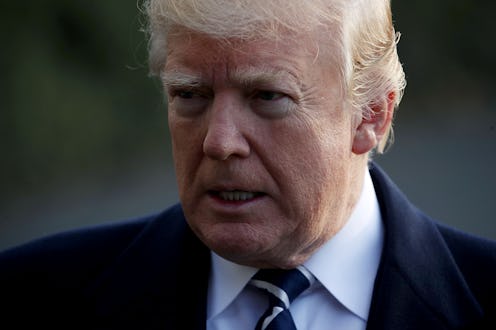News
How Trump's Presidency Is Hurting People Outside Of The U.S.

When you get caught up in what the Trump administration is doing at home, it can be hard to think about anything else. However, Americans aren't the only ones feeling the effects of the current administration. There are a lot of ways that Trump's presidency hurts people outside of the United States, too.
Some manifestations of this are fairly straightforward. Pretty much as soon as Trump stepped into the Oval Office, he reinstated the so-called Global Gag Rule that withholds U.S. foreign aid from any organization that so much as uses the word "abortion." This move makes access to life-saving health care more difficult for women and men around the world, and has damaging consequences on global public health in general, as American aid funds important public health work all over the world.
Then there's his multiple attempts at the travel ban, the latest of which the Supreme Court has allowed to stay on the books, at least for now. The ban — which was amended to include Venezuela and North Korea in what many view as an attempt to avoid the claim that it's specifically targeting Muslims — affects citizens from several countries where ongoing conflict has made life difficult and dangerous: Chad, Iran, Libya, North Korea, Somalia, Syria, Venezuela, and Yemen. Trump has thrown the lives of thousands of people into uncertainty as their efforts to get to safety in the United States fail in the face of the ban.
Trump's recent announcement that the United States would recognize Jerusalem as the Israeli capital has also already caused turmoil. Many leaders have issued grave statements about the negative effects that this unilateral declaration could have on the Israeli-Palestinian peace process. One Guardian columnist even claimed that Trump's statement was in effect "an act of diplomatic arson." In what is such a fraught diplomatic environment already, any additional tension that Trump creates with reckless policymaking could lead to actual lives lost.
Even some of Trump's smaller actions, like retweeting discredited anti-Muslim videos from a far-right party leader in the U.K., could provoke consequences. Both civil rights and Muslim organizations fiercely criticized Trump for essentially endorsing an extremist, Islamophobic political party abroad.
Trump hasn't shied away from anti-Muslim sentiments in the past. Besides his earlier travel bans, he ran a campaign championing Islamophobic policies, including his call to ban all Muslims from entering the United States. Many say Trump's anti-Muslim rhetoric is contributing to an uptick in hate crimes against Muslims in the country, and endorsing right-wing extremist fringe groups from abroad could empower those outside it as well.
There's also his Secretary of State Rex Tillerson, the former ExxonMobil CEO who had no political or diplomatic experience prior to taking on that role. By way of Tillerson, Trump is seriously hurting the State Department by cutting its budget and pushing people out from its highest ranks. Trump has also left important diplomatic positions unfilled. Pushing career diplomats out hurts America's position and citizens abroad and its diplomatic capabilities, making it less of a world player and allowing other countries to move ahead. When those countries have sordid records on human rights — and some of them do — then could have serious repercussions for people in war-torn or non-democratic nations.
While many of these affect only certain countries or certain groups of people, the Trump administration could have serious global consequences as well. Trump's been hawking what he sees as his own success evident in the economy, but international monitors believe that his administration and its inward-looking policies could actually pose a huge threat to the global economy.
The economic protectionism — that is, more restricted international trade markets — that Trump favors lead to slowed economic growth for the countries that maintain those restrictions. Protectionist policies could lead to more expensive products for consumers and threaten the job and income growth that has happened since the recession, especially when the world's biggest economy is instituting them. The world is still recovering from the economic downturn of 2008, yet Trump may be leading us toward another one that could be even worse.
Then there's the global fight against climate change, which Trump has withdrawn the country from by pulling out of the Paris climate agreement. Scientists overwhelmingly agree that climate change is real, that it is caused by humans, and that it presents enormous danger to all of humanity if we don't step up and begin changing things. Already, there's an argument that climate change and its resulting lack of natural resources like water and arable land helped to cause the war in Syria, and there are already so-called climate refugees who have had to flee from their homes in low-lying islands in the Pacific.
The United States is the only country that isn't part of the Paris agreement, and it's also the most significant carbon polluter in the world. Under Trump, the federal government is doing the least out of any country in the world to try to stop it. The consequences of climate change are clear to anyone paying attention and they will only get worse unless the world turns a corner. With Trump at the helm of the United States, it's looking less likely that that will happen.
In short, Trump is not making the world a better place. If you needed more reason to resist — and strongly — then here it is.
Editor's Note: This op-ed does not reflect the views of BDG Media and is part of a larger, feminist discourse on today's political climate.